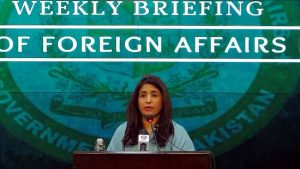Pakistan has been reassured by the Afghan interim government that ‘all difficulties’ will be resolved: the Foreign Office.
The FO strongly encourages India to stop its persecution of the IIOJK and to stop supporting terrorist operations in Pakistan.

According to the Foreign Office on Thursday, the Taliban interim government in Afghanistan has promised to resolve “all concerns,” including terrorist threats coming from Afghan territory.
Responding to a query at a year-end briefing in Islamabad, spokesperson Mumtaz Zahra Baloch said Pakistan has been in contact with Afghan authorities on all issues, including the border situation, the security of diplomats and missions, and the terrorist threat Pakistan faces from militant groups operating from Afghan territory.
According to her, Pakistan has a natural interest in the peace and stability of Afghanistan and would like to keep cooperating and seeking solutions to all pressing issues.
Baloch further urged India to stop oppressing the people of Illegally Indian Occupied Jammu and Kashmir (IIOJK) and to stop funding terrorism inside Pakistan in order to undermine that nation.
According to her, Pakistan is open to discussion and peace, and it is up to the Indian government to act responsibly to mend fences.
The spokesperson responded to a query regarding the trips taken by Foreign Minister Bilawal Bhutto Zardari by saying that they serve as “demonstrations of the international community’s interest in engaging with Pakistan” and fostering understanding on a variety of problems.
With improved interactions, visits, and exchanges, she noted, “we can develop our friendship, collaboration, and conversation with the international community.” She stated that Pakistan is interested in extending and strengthening its relationships around the world.
In response to a different query, the FO spokeswoman stated that Pakistan is appreciative of the humanitarian aid given to the flood-affected citizens of Pakistan by many nations as well as international financial institutions and organisations.
Among them, according to her, are Belgium, China, Denmark, the European Union (EU), France, Germany, Greece, Indonesia, Italy, Iran, Jordan, Malaysia, Nepal, Oman, Palestine, Qatar, Russia, Saudi Arabia, Saudi Arabia, Singapore, Tajikistan, Turkmenistan, the United Arab Emirates, the United Kingdom, the United States, and Uzbekistan, as well as a few multilateral financial institutions and the United Nations (UN).










































